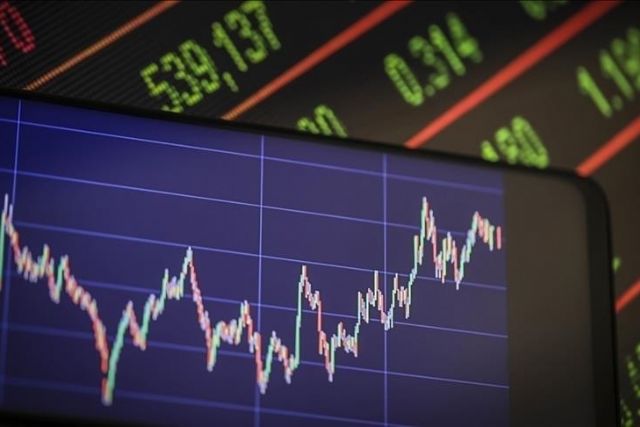Russia-Ukraine war shrinks global growth forecasts
War has had negative impact on energy, food, commodity prices and exacerbated high inflation, causing it to reach record high levels

ANKARA
International financial bodies have cut their global growth estimates one after another due to new uncertainties caused by the Russia-Ukraine war, while the world economy is still trying to recover from the coronavirus pandemic.
The war has had a negative impact on energy, food and commodity prices, and it has exacerbated high inflation, causing it to reach record high levels in many countries.
Many international financial bodies now argue that the war will cause a significant slowdown in the global economy.
The International Monetary Fund (IMF) now projects global growth to come at 3.6% in both 2022 and 2023, which are 0.8 and 0.2 percentage point lower, respectively, than it previously forecast made in January.
"The downgrade largely reflects the war's direct impacts on Russia and Ukraine and global spillovers," the IMF said in its latest World Economic Outlook report published on April 19.
"The economic effects of the war are spreading far and wide -- like seismic waves that emanate from the epicenter of an earthquake – mainly through commodity markets, trade, and financial linkages," it added.
The World Trade Organization (WTO) announced last month that it has lowered its global growth forecast for 2022 to 3.2%, from its previous estimate of 4.1%, due to the war.

Harder for the poor
World Bank Group President David Malpass said on April 18 that people are facing reduced commercial activity and trade. In addition, he said, the debt crises and currency depreciations have a burden that falls heavily on the poor.
"Food crises are bad for everyone, but they're devastating for the poorest and most vulnerable. There are two reasons. First, the world's poorest countries tend to be food importing countries. Second, food accounts for at least half of total expenditures in household budgets in low-income countries, so it hits them hardest," he told reporters in his opening remarks at IMF-World Bank spring meetings.
The WTO noted on April 12 that it now expects merchandise trade volume to grow 3% in 2022, down from its previous forecast of 4.7%.
It also anticipates global merchandise trade volume to expand 3.4% in 2023, but said it is "less certain than usual" due to the war.
"The most immediate economic impact of the crisis has been a sharp rise in commodity prices. Despite their small shares in world trade and output, Russia and Ukraine are key suppliers of essential goods including food, energy, and fertilizers, supplies of which are now threatened by the war," it said in a statement.
European Union
The EU announced Monday that it expects gross domestic product (GDP) to expand 2.7% this year and 2.3% next year.
While this marked the first economic growth predictions made by the European Commission since Russia invaded Ukraine on Feb. 24, its previous growth estimate was 4% for 2022 and 2.8% for 2023.
"Russia's invasion of Ukraine has posed new challenges, just as the Union had recovered from the economic impacts of the pandemic. By exerting further upward pressures on commodity prices, causing renewed supply disruptions and increasing uncertainty, the war is exacerbating pre-existing headwinds to growth, which were previously expected to subside," it said in a statement on Monday.
The European Bank for Reconstruction and Development (EBRD) announced on April 10 that it has also cut its growth projection for this year by 0.6 percentage point.
The EBRD said it now expects regions where it operates to grow 1.1% this year, down from its previous projection of 1.7% in March, according to its latest Regional Economic Prospects report.
It anticipates Russia's war on Ukraine to cause a greater economic slowdown and more inflationary pressure.
UN sees ‘weakened recovery'
The UN Conference on Trade and Development (UNCTAD) said on March 24 that it forecasts global economic growth to slow to 2.6% this year, down from its previous estimate of 3.6%.
UNCTAD also said developing countries will need $310 billion to meet their external public debt service requirements this year.
"The economic effects of the Ukraine war will compound the ongoing economic slowdown globally and weaken the recovery from the COVID-19 pandemic," UNCTAD Secretary-General Rebeca Grynspan said in a statement.
The Organization of the Petroleum Exporting Countries (OPEC) has also lowered its global economic growth expectation for 2022 to 3.5%, from 3.9%, anticipating Russia seeing economic contraction, while lowering growth estimates for the US, the eurozone, Japan, China, India, and Brazil.
"Challenges related to ongoing geopolitical tensions, the continued pandemic, rising inflation, aggravated supply chain issues, high sovereign debt levels in many regions and expected monetary tightening by central banks in the US, the UK, Japan and the euro area require close monitoring," OPEC said in its Monthly Oil Market Report released on May 12.
Think tanks joined global financial bodies in lowering their global growth estimates as well.
The Washington-based Peterson Institute for International Economics (PIIE) said on April 14 that it expects global economic growth to slow from 5.8% in 2021 to 3.3% in 2022 and 2023.
Just last October the PIIE projected the world economy would expand by 4.9% in 2022.





